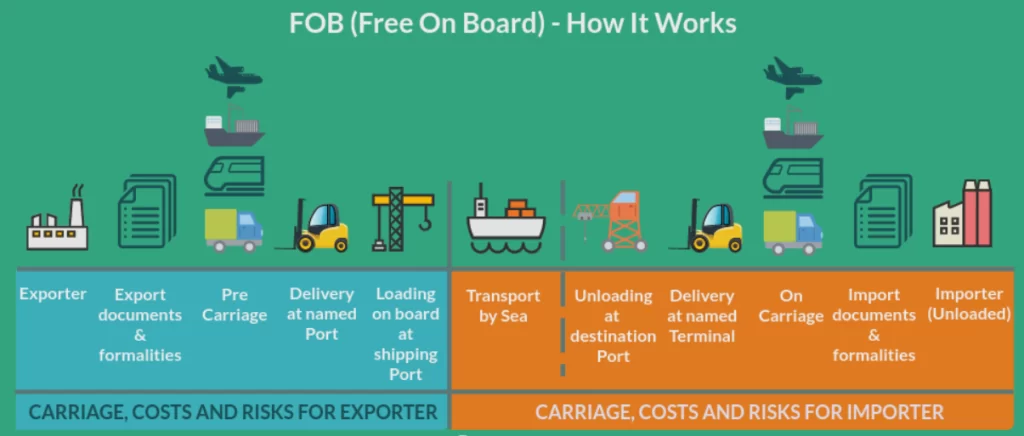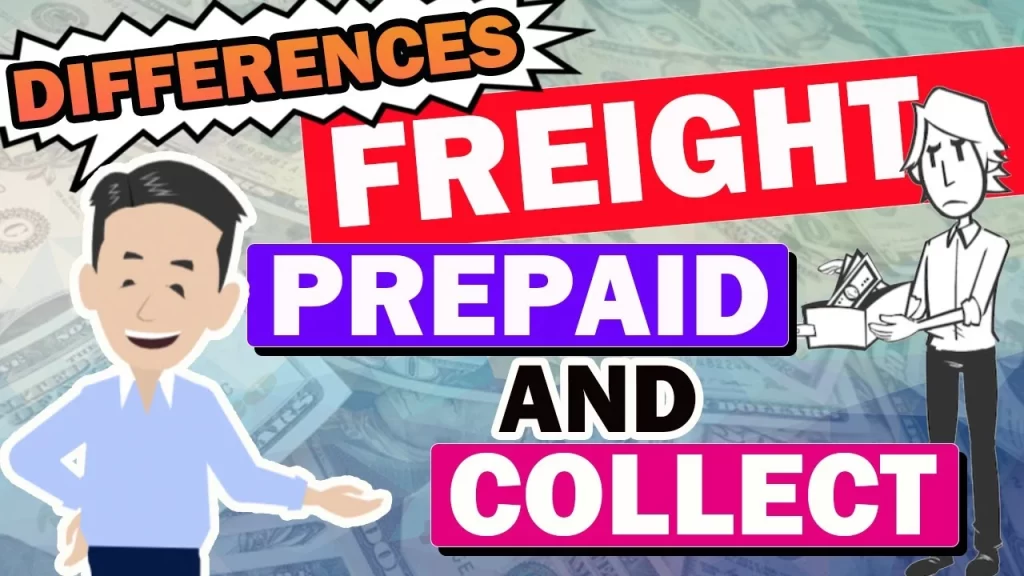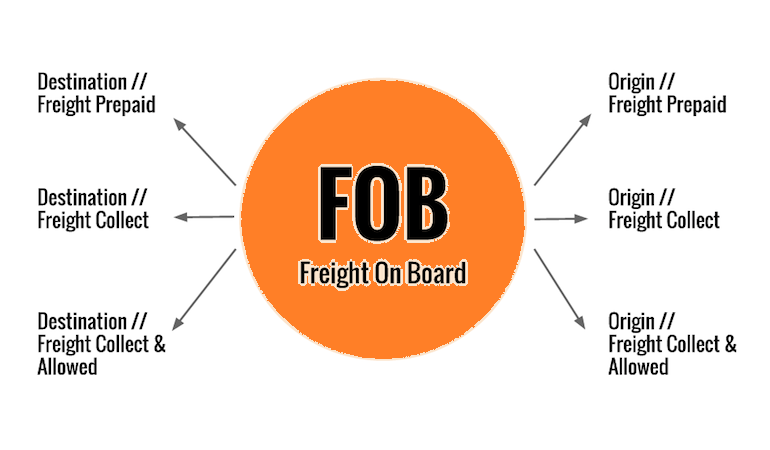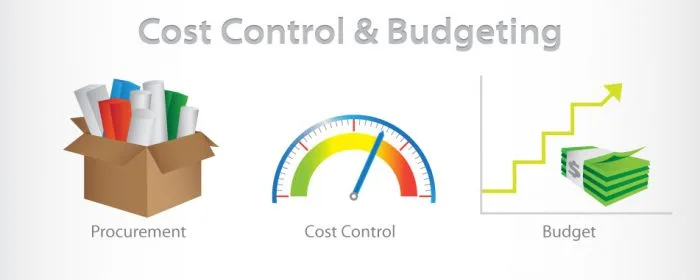Free on Board is another name for FOB. This rule is significant because it clarifies international maritime trade transactions’ responsibilities, roles, and procedures.
To conduct international business without confusion or other monetary losses, you must comprehend this rule. People ship many goods these days, and when they do, they often see the acronym FOB on their shipping paperwork. The meaning of the FOB would only need to be known by a select few. Learn what FOB means by using the explanation provided below.
Chapter 1. What does the shipping term “free on board” (FOB) mean? Everything you need to know
1. Understanding FOB: Definition and Important Ideas
In shipping, “free on board” (FOB) is a crucial word that indicates the point at which the buyer assumes responsibility for the goods. FOB terms provide that until the products are loaded aboard the assigned transport vessel, the seller bears all shipping-related expenses and risks. This covers the cost of packing and shipping the items to the destination.
The customer is in charge of paying for shipping, insurance, and any potential losses or damages during transit after the goods are on board. By outlining each party’s responsibilities clearly, FOB helps to avoid confusion and disagreements about who bears what costs and risks.
When a business sells machinery and offers FOB terms, for instance, it signifies that the seller pays all expenses up to the machine is loaded onto the ship. After that, the buyer assumes control and is responsible for handling the shipping and any other expenses or hazards.
2. Three Crucial Uses for FOB in Shipping
FOB phrases are frequently used in e-commerce, small enterprises, and international trade, among other shipping scenarios. FOB aids in the cost and logistics management of cross-border shipments in international trade.
For instance, FOB clauses guarantee that the buyer will pay shipping and insurance charges after the products are placed onto the vessel when a U.S. corporation purchases components from a Chinese supplier.
FOB terms relieve small enterprises, like a Czech bead manufacturer, of the burden of shipping, allowing the seller to focus on quality rather than logistics. For international shipping, FOB terms are essential in the world of e-commerce.
For example, FOB is used by an online retailer of home décor products to transfer ownership to the customer as soon as the products leave the warehouse, streamlining international sales and facilitating more effective shipment management.
3. Why is FOB important?

A clear separation of duties between the seller and the customer is established by FOB, and this is vital for controlling transportation expenses and logistics. FOB terms lower the likelihood of conflicts by outlining the transfer point and ensuring that both parties are aware of their responsibilities.
Both partners benefit from this clarity when it comes to financial planning and budgeting. FOB assists sellers in accurately determining their prices by including in all applicable transportation expenses up until the point of transfer.
Buyers can better manage risks and budget for unforeseen expenses by being aware of the precise point at which they become liable. All things considered, FOB offers an organized method that streamlines dealings and guarantees more seamless operations during the shipment process.
4. Different Shipping Terms vs. FOB
Different shipping terms provide varying degrees of accountability in comparison to FOB. The seller’s obligation to pay for shipping and insurance charges is extended by CIF (Cost, Insurance, and Freight) until the goods arrive at the port of destination.
Under CFR (Cost and Freight), the buyer is in charge of insurance and the seller merely pays for the freight. Unlike FOB, where responsibility is transferred when the products are on board, FAS (Free Alongside Ship) requires the buyer to take responsibility as soon as the goods are placed close to the ship.
Ex Works, or EXW, transfers all obligations, including export authorization and shipping, to the buyer at the seller’s plant.
Delivered Duty Paid, or DDP entails the seller bearing all expenses and liabilities up until the products are delivered to the buyer. Knowing these terms makes it easier to choose the best shipping plan for the particular requirements and obligations of the transaction.
5. FOB Shipping Point in Action: Real-World Case Studies
The practical ramifications of the FOB shipping point are demonstrated through its application in multiple circumstances. For example, a producer can better oversee and manage prices by using FOB terms to limit shipping expenses until goods are put onto a ship.
Under FOB conditions, an electronics buyer bears all liability for import tariffs, insurance, and transportation, which may result in higher costs but gives them more control over the shipping procedure.
FOB eases international shipments for e-commerce companies like online retailers by shifting accountability to the customer as soon as goods are delivered from the warehouse.
These actual cases show how FOB phrases work in various situations and emphasize their significance for handling the financial and logistical sides of shipping.
6. Negotiating FOB Shipping Terms

Clear communication between parties and a deep understanding of Incoterms are essential for a successful negotiation of FOB shipping conditions. To avoid misconceptions, detailed contracts should outline all cost duties and precisely define the point of transfer.
For all sides to understand their responsibilities and to reach an agreement on terms, open communication is essential. Professionals in logistics can offer insightful advice and assist in handling complicated shipment arrangements.
Clear expectations are created, and shipping procedures are optimized. The possibility of disputes is decreased with the help of effective FOB term negotiation.
Both buyers and sellers may ensure a more seamless transaction and manage the shipping process more effectively by defining clear agreements.
Chapter 2. Freight Prepaid vs. Freight Collect

1. Prepaid Freight
Prepaid freight is the term used when a vendor incurs all transportation charges to the buyer’s ultimate point of delivery. It is a word that is regularly used in the Free on Board (FOB) discussions, and it means that the seller will pay all the transportation costs incurred until the goods are handed to the buyer.
The seller absorbs the cost of delivery of the products which includes the processing and the shipping.
Since the buyer will not have to worry about how to arrange for shipping or how to pay for transportation, this helps to simplify the buyer’s role in the transaction.
Sellers dispatch goods to buyers Incharee is done by revamping or ensuring all transport systems where on payment of shipping cost a specified area is delivered.
This often includes documenting that any organic printable air or reached has always been called for by any ground shipment. This means among other things making providers make a huge saving in logistical costs and to the buyers.
For instance, an electronic component vendor can apply prepaid freight so that the buyer is assured that the items will be sent to him and nobody will need to deposit any surplus shipping costs for sending the items.
2. Benefits of Prepaid Freight

The most important benefit of Prepaid Freight usually goes to the buyers. Since all transportation expenditures are managed by the seller, it becomes easier for the buyer to purchase because the end price is inclusive of all costs.
There would be no need to worry about these additional shipping costs would not be needed as the total amount of the item would be all about the price of the item itself.
There is also a reduction in the administrative burden on the buyer, under the Prepaid Freight since none of the buyers have to file any damage claims or deal with transport. These administrative functions are delegated to the seller letting the buyer concentrate on other activities.
This situation suits those companies who do not want to deal with the nuisances of freight management and wish to save time and be more productive.
3. The Drawbacks of Prepaid Freight
The prepaid freight undeniably has its share of disadvantages. A big negative aspect in this case is the lack of buyer’s power to control the shipping process.
Since the seller takes care of the logistics, limited power is left to the buyer, as pertains to the supply chain, in the event of any problems occurring when the goods are in transit, this may pose a challenge.
Moreover, transportation is usually included in the rates for the goods, which could imply that the buyer may incur higher costs.
This problem is particularly worrying about international trade as one would Assert the same recommendation across the board. The writer ought to modify according to the manufacturer and importer parties’ desirability.
4. Freight Collect
Freight Collect is another form of Prepaid Freight but here, the buyer bears the risks of all shipping and handling fees and processes.
In this case, the buyer incurs costs for carrying the goods from a given port to the final place and even forsakes the goods charged, when they are packed for shipment.
The method provides control of the shipping process to the buyer in that they can choose their logistics company, rates as well as terms.
Freight Collect is quite popular among companies that would like to have a high level of management in their supply chain and shipping management systems according to their specifications.
This is especially beneficial for those companies that have good relations with freight forwarders and are used to handling imports and exports.
5. When to Use Collectible Freight

The Freight Collect option is ideal for organizations who wish to maintain control and manage the costs of their shipments. Since the buyers themselves handle the shipping arrangements.
They can get competitive rates from the freight houses and also eliminate other hidden costs that may have been folded up in the price of the product under the Prepaid Freight option.
This control also includes authority and control over customs clearance and incoterms which can help the buyer manage all aspects of shipping according to his/her requirements.
Nevertheless, from the point the Shipment is “Freight Collect,” this option exposed the buyer to more duties. They take up all the risks of a shipment from the point of FOB.
This includes getting insurance for the products, and ensuring that all the necessary shipping documents are secured. Coordinating the movement of items to prevent delays in delivery.
For companies that possess the know-how and capacity to undertake these duties. Freight Collect provides a degree of accuracy and flexibility in the management of these activities. Therefore, greatly enhancing supply chain management.
Chapter 3. The benefits and Drawbacks of FOB
Benefits of FOB
1. Strategies for Budget Management and Cost Control

FOB terms provide purchasers more control over the cost of shipment. Buyers can get attractive prices by choosing the freight forwarder of their choice, guaranteeing that the cost of transportation fits within their budget.
This independence aids customers in avoiding unstated costs that could be included in product costs under alternative shipping arrangements.
Furthermore, direct control over the shipping process might result in financial savings. Particularly in situations involving large cargo or long-distance transportation.
Conversely, sellers gain from shifting the cost of shipping to the customer. Freeing them up to concentrate on their primary business operations, such as manufacturing and sales.
The seller’s pricing strategy is made simpler by this arrangement because it eliminates the need for them to account for variable shipping expenses.
All things considered, FOB is a financially advantageous method for both sides. With the vendor benefiting from less logistical work and the buyer having greater budget control.
2. Risk Reduction in Transportation and Insurance

FOB arrangements give purchasers the power to control transportation-related risks. Once the products leave the seller’s premises, the buyer takes ownership of them and is free to choose the insurance plan that best suits their needs.
By allowing customers to select the right coverage levels and suppliers. This control lessens the financial effect of loss or damage sustained during transit. Sellers lessen their exposure to disputes and claims about shipping events by assigning these responsibilities to others.
By concentrating primarily on transporting the goods to the delivery point. This risk transfer benefits the seller by protecting them and streamlining their business processes.
This change makes the customer more liable. But it also gives them more control over how they manage risks by choosing their insurance wisely.
3. Simplifying Processes to Ensure Effective Delivery

FOB terms facilitate the delivery procedure for vendors and purchasers alike. The benefit of working directly with carriers is that buyers can make sure that deliveries adhere to their precise specifications and timetables.
Because of this direct communication. The logistics chain can be more precisely controlled, reducing delays and guaranteeing that the goods arrive on time.
As soon as the items are loaded for transportation. Sellers are relieved of their responsibilities, which simplifies the shipping process for them.
Sellers may concentrate on production and other crucial business operations. Without having to worry about handling shipping logistics thanks to this reduction in logistical complexity.
FOB terms benefit all sides by lowering potential bottlenecks and guaranteeing that goods arrive at their destination on schedule. They also help to improve supply chain management.
4. Negotiating Shipping Terms with Flexibility

FOB conditions provide you with a lot of negotiation power when it comes to shipping arrangements. Direct negotiation between buyers and carriers enables them to customize shipping conditions to meet their unique requirements.
This flexibility includes the ability to select routes, carriers, and schedules. That most closely matches the buyer’s financial limits and operational needs.
By shifting the weight of the negotiations to the buyer. This arrangement also benefits the sellers, who can now concentrate on other facets of their business.
With the flexibility to alter shipping arrangements. Both sides may make the most of their logistics plans, cutting expenses and boosting productivity.
Therefore, FOB terms give a framework that is flexible enough to fit the various needs of international trade. Giving buyers and sellers the chance to improve supply chain management.
Drawbacks of FOB
1. Increased Purchaser Costs as a Result of Long-Distance Shipments

A woman analyzes the prices for the purchase of vehicles. The cost of auto maintenance is increasing. High interest rates for buying a car on credit. Insurance and automobile repair. Magnifying glass
The potential for higher buyer costs, especially for long-distance goods, is a major disadvantage of FOB arrangements. Buyers may incur higher costs if they are responsible for paying freight from the seller’s location to their destination.
Particularly if the distance is significant. These expenses may cover additional handling, insurance, and customs clearance fees in addition to the freight rates.
Additionally, changes in fuel prices and other transportation-related costs may raise the final cost. Making it more challenging for purchasers to plan ahead and manage their shipping budget.
The buyer’s finances may be strained by this unpredictability. Especially if they are handling big quantities of merchandise or regular shipments.
Because of this, FOB terms provide buyers control but also run the risk of increasing expenses, which they must carefully regulate.
2. Greater Accountability for Planning and Supervising Transportation

FOB agreements give purchasers a great deal of responsibility for organizing and managing the whole shipping process. The logistical chores that buyers must perform are many and include anything from choosing an appropriate carrier to organizing paperwork. Guaranteeing compliance with international shipping laws.
A detailed grasp of the shipping procedure and the capacity to address any problems that may occur during transit are prerequisites for this heightened accountability.
This can be a difficult task for purchasers who are not familiar with logistics, and it may result in delays, higher expenses, or even the loss of items.
The complexity of managing FOB shipments is further increased by liaising with numerous stakeholders. Including carriers, customs officers, and insurance companies. As a result, although FOB terms provide you with control. They also require a high degree of skill and close attention to detail.
3. Potentially Lower Seller Pricing Competitiveness
It could be difficult for sellers who accept FOB terms to keep their prices competitive. The buyer must account for transportation and insurance charges as they are not included in the quoted price under the FOB Origin terms, which could lead to a higher total landing cost.
When compared to other suppliers who might include shipping in their pricing, the seller’s offer may seem less appealing due to this additional cost.
Furthermore, customers frequently analyze overall costs in highly competitive sectors. So a reduced base price with higher shipping fees might not be as enticing. Sellers need to think carefully about how FOB terms. This affects their competitiveness in the market and how they set their prices.
Offering comprehensive shipping choices may occasionally be required to draw customers and keep up sales volume, even if doing so means bearing a portion of the freight expenses.
Chapter 4. FAQs About Free On-Board Shipping
Conclusion
Among the most commonly used terms in any international trade, the “Free On Board” (FOB) defines which point the goods transfer takes place and the possession together with liability changes from the seller to the buyer. Conditions of FOB make it mandatory that all expenses. Hazards are passed over to the buyer once the product is dispatched, which is referred to as FOB Origin. Or FOB Destination whereby all obligations fall to the seller until the goods arrive in the buyer’s premises. These terms here are important in cost containment, risk management, and even the planning of operations.
Understanding and implementing the FOB terms can prove to be quite challenging. Especially for organizations that participate in trade activities on a global level. This is where AsianDavinci comes in to assist. Being specialists in both international trade and logistics. We provide tailored assistance in the area of your business to ensure that your FOB terms are best suited to your requirements.
